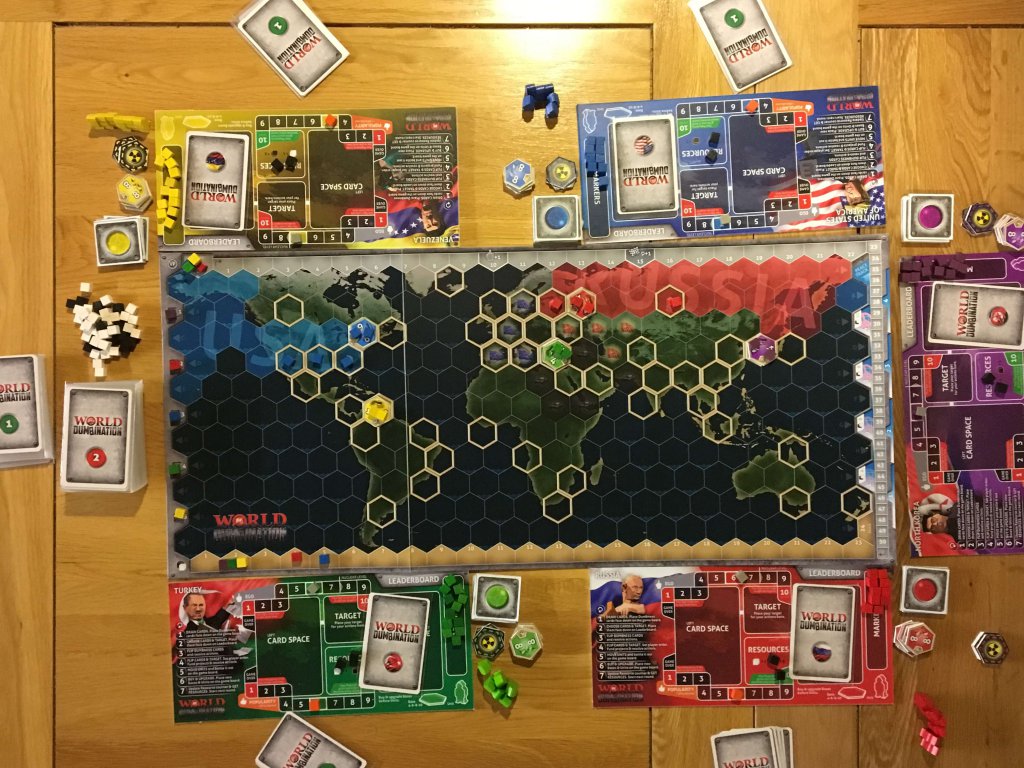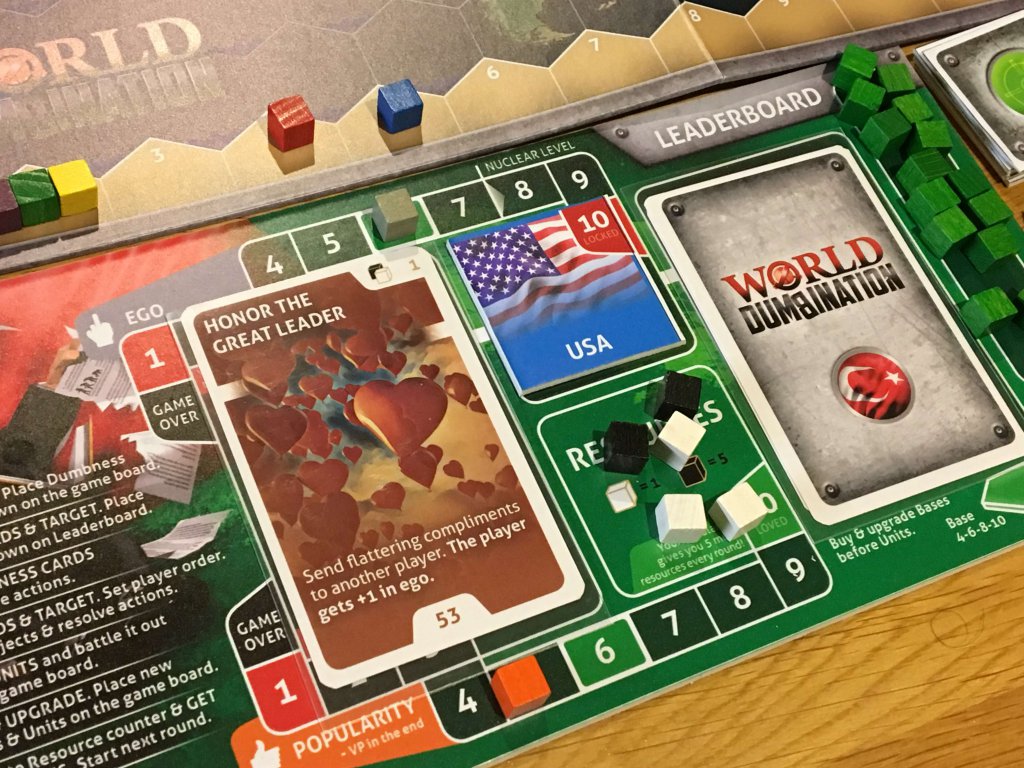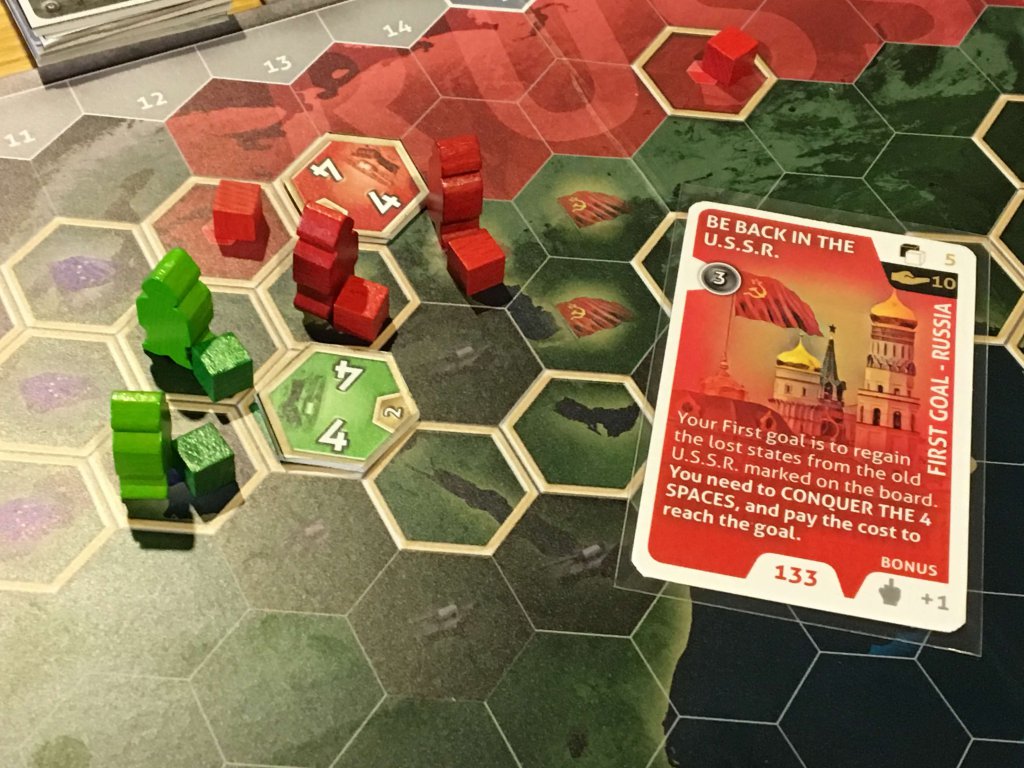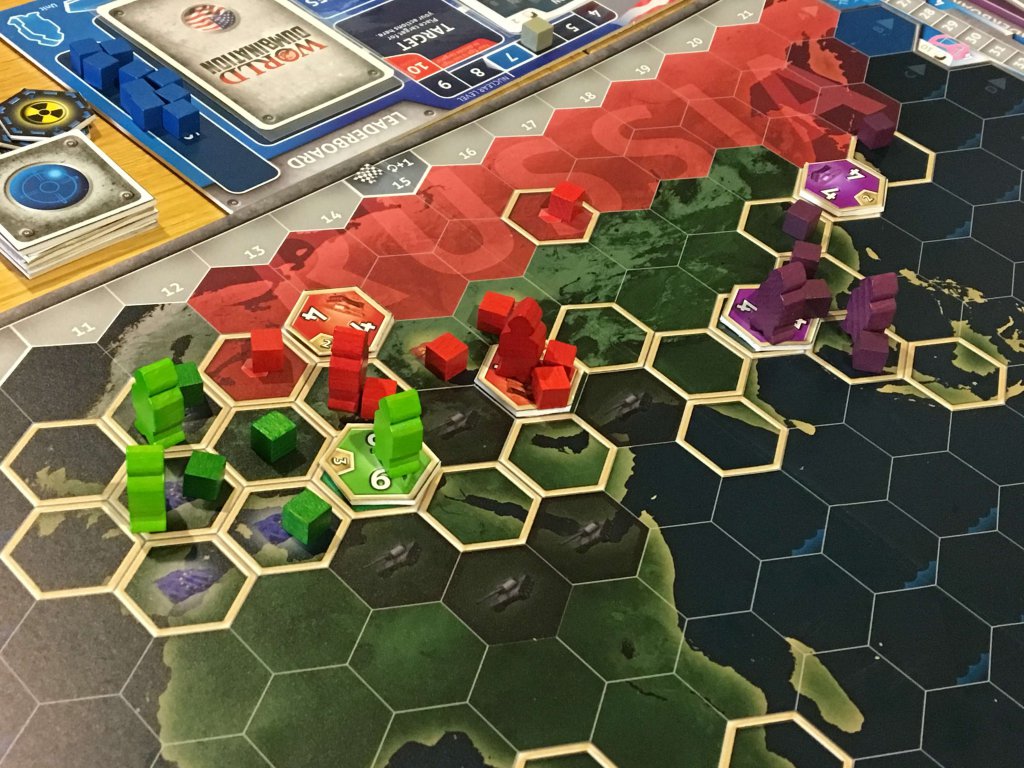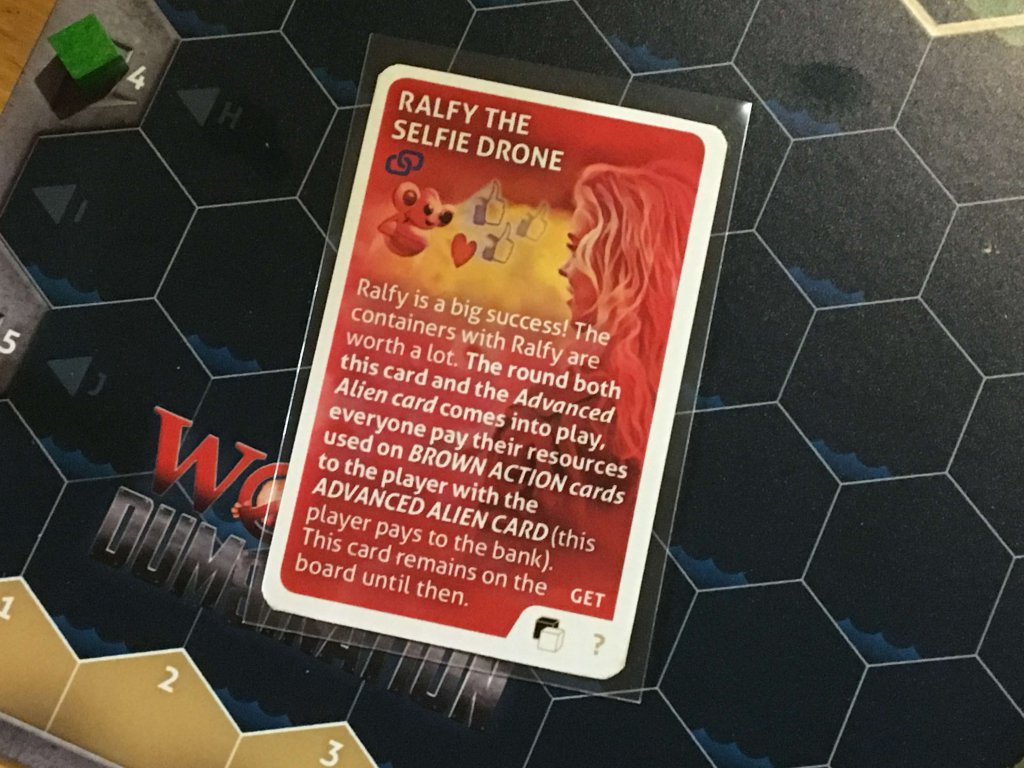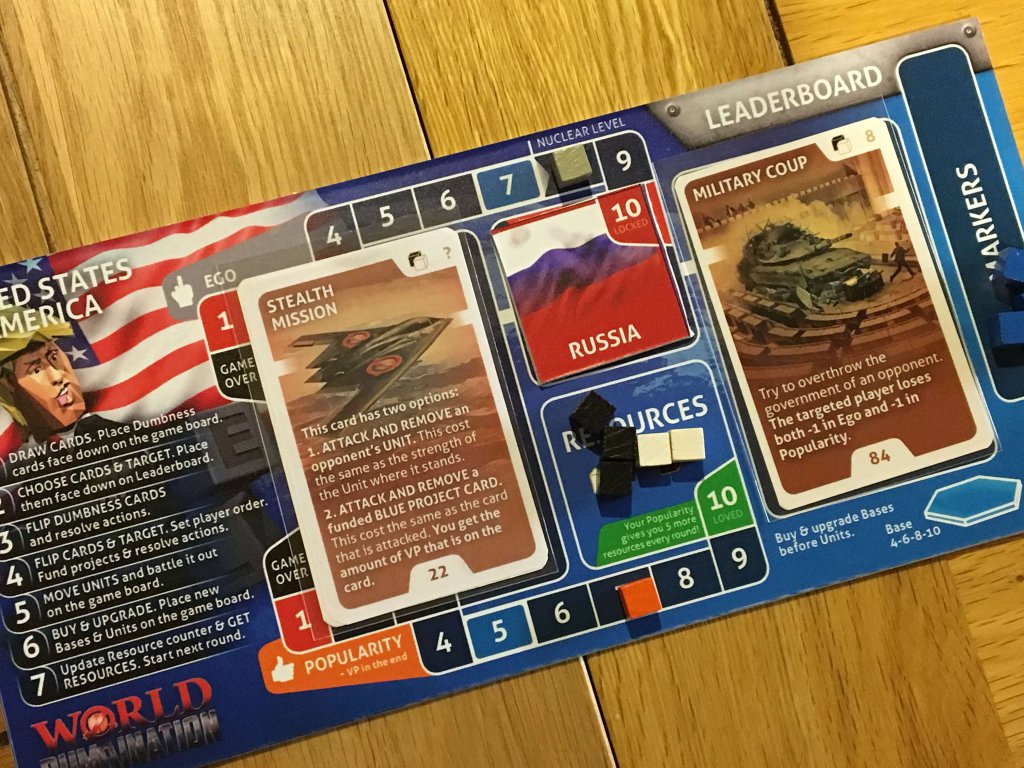Many board games allow players to act out their fantasies of world domination, but how many of them truly explore the egotistical nature of the world leaders who live out this reality on a daily basis? World Dumbination is an upcoming Kickstarter from Muzak Games and designer Jan Richard Hansen that calls out global politics for the farce that it has become in recent years — but does it sacrifice gameplay in search of satire? Find out in our exclusive preview.
Essentially a war game that uses a card driven system reminiscent of a simplified Twilight Struggle, World Dumbination pitches a story that is as ridiculous as a game with dumbination in its title might suggest. In short, aliens have been watching the Earth for some time and in doing so, have seen us destroy ourselves. Compelled to save the human race, these aliens “rescue” all but five of the world’s leading politicians, leaving them to sort out the mess they have created.
This story only serves to set the scene for the gameplay, which supports two to five players in different configurations depending on the exact count. With its full quota of countries in play, the protagonists will be the USA, Russia, North Korea and, of course, Venezuela and Turkey. Whilst the inclusion of the first three nations in a game about world power are obvious, the latter two are less obvious.
Personally, I think this has something to do with how the game actually works, so let me explain more about it. World Dumbination is a game about control, to some extent, as well as managing a number of tracks that ultimately inform several loss conditions and trigger the end game. Players need to manage both the Ego and the Popularity of their leader, whilst also gathering resources, maintaining world peace and tracking victory points depending on their achievements.
The importance of Venezuela and Turkey is one of geography. Most of World Dumbination’s key resource locations span the globe roughly along the central band of the board — along which the USA, Russia and North Korea happen to lie, albeit all of them slightly to the North. Adding Venezuela and Turkey provides world powers that are readily open to ridicule, whilst also being conveniently placed from a gameplay perspective, though I do so wish that Hansen had included Brexit-Britain and The Maybot among his idiotic cast of characters.
Each turn in World Dumbination is split into several phases, many of which are administrative or cleanup really, so I won’t describe them all in low level detail. The basic flow of the game involves players choosing one card from a hand of five (at the beginning of the game) and then placing it face down onto their leader board. During the first half of the game, only one card can be placed, but once a “First Objective” card that occupies a second slot has been completed, two can be played each turn.
At the same time as a card is played, the player will also place a target token face down, which will usually indicate which of the opposing factions the player wishes to target. Not all cards are bad by any means and there is a decent mix of directly interactive cards, as well as those with personalised or even global effects. World peace can also be the target for some cards, which allows the players to increase the popularity of their leader, whilst essentially passing the turn with respect to advancing their own plans — assuming their plan isn’t to achieve world peace, which it might be.
Each card will cost a certain amount of resources, which as I mentioned earlier are generated from certain hexes on the board. These hexes can be controlled by moving units onto or over them, after which a control marker is placed. Movement of units is a separate phase of each turn to card play, but it’s quick and simple thanks to the way that units are tied back to local bases, depending on their current strength. Simply put, a unit can move a number of hexes equivalent to half the strength of the most powerful base that nation controls. A four strength base would allow two movement, for example.
Moving briefly back to card play for a moment, the normal flow can sometimes be interrupted by the arrival of a Dumbness card. When this happens, the players will resolve them separately. In general, dumbness cards affect everyone and may or may not be bad, though I think I can say that almost all of them are quite swingy and fairly powerful. Thankfully, only a relatively small number are shuffled into the decks during setup.
One thing I really did enjoy about World Dumbination was the inclusion of the First Objective cards, which add some flavour and a bit of story to the game. Each nation chooses one from two when starting the game and will then keep it secret. One of Turkey’s objectives, for example, is to “join” the European Union by simply capturing all of it, whilst the Russian player might want to reunite the Soviet Union. Trump has an objective to simply be liked, whilst the unpredictable Kim Jong Un can choose from either nuclear war or nuclear disarmament.
Along with the dumbness cards which swing wildly between “hard to explain” and “thematically and politically relevant,” these First Objective cards provide the real theme and focus. Once completed (usually about three to five rounds into a game) the players open up their second action slot and will likely have the resources to play two cards often, which will quickly accelerate the game towards the fifteen point endgame trigger.
There are several loss conditions, including having your leader ego or popularity track fall to zero. Interestingly, a players ability to play cards and do things begins to be affected at low numbers on these tracks also, which can make a losing position feel unrecoverable. I also found that Turkey has a hard time against an aggressive Russian opponent and whilst Venezuela is in a similar position against the USA, the American player will need to go out of their way to track down the South American player.
North Korea, on the other hand, can feel a little bit left alone unless the Russian and/or USA player goes for them early on, so I do think that there are some balancing issues to sort out during the Kickstarter. That said, asymmetry of this kind is a good thing since it allows “the owner” of the game to effectively handicap themselves within the structure of the game, which I do like.
At two and four players, the rules advise on which nations should be in play, which can include the USA and Russia having Venezuela and Turkey in play as puppet states, which makes sure the board stays nice and full. I should also mention that whilst combat between units is present (also a simple equation based on the strength of nearby bases) it’s not the key element of the game.
Card play — which often doesn’t require adjacency, hence the target tokens — is the best way to affect players. I’ve seen Trump defeated early due to Venezuela forcing his ego off the scale, for example. Of course, this can mean that player elimination is a problem, so if you really dislike the idea of being killed off early and having to sit out about thirty to forty minutes of gameplay, you may want to bear that in mind.
World Dumbination is as daft an idea as it sounds, but to answer my own question — it does not sacrifice gameplay for satire. Instead, it delivers its political message clearly, but in a way that doesn’t seep into unwelcome areas of the gameplay experience. The card play mechanism that links to the first objective is novel, whilst movement and combat is clean, predictable and smart. There are some balancing issues, but nonetheless I feel confident that World Dumbination could be the lightweight, politic wargame that 2019 will need in order to see us through the post-Brexit doom and gloom that is to come.
An early preview copy of World Dumbination was provided to make this preview possible. You can read more about Muzak Games on their website, here, and as soon as the Kickstarter for World Dumbination is live, we’ll update this post.
Love board games? Check out our list of the top board games we’ve reviewed.

